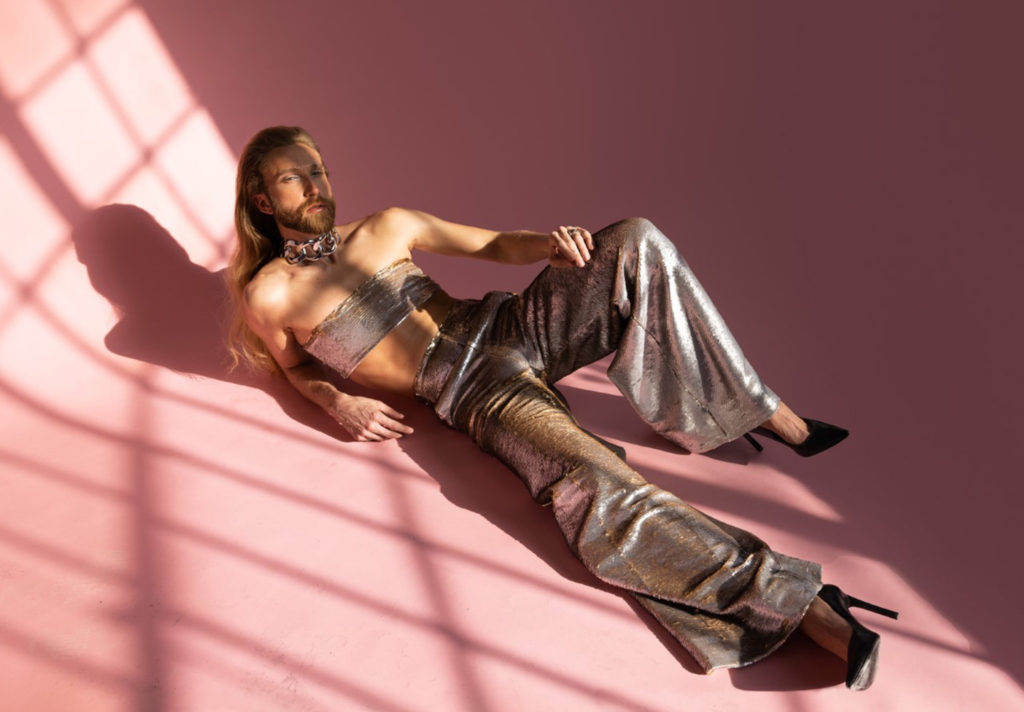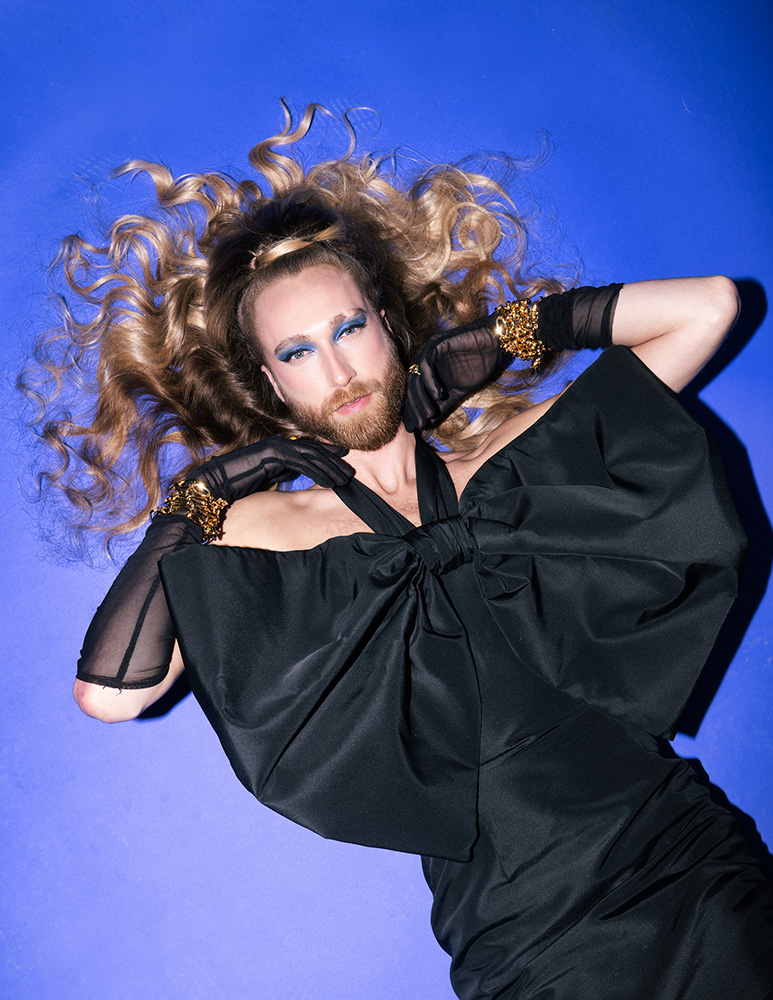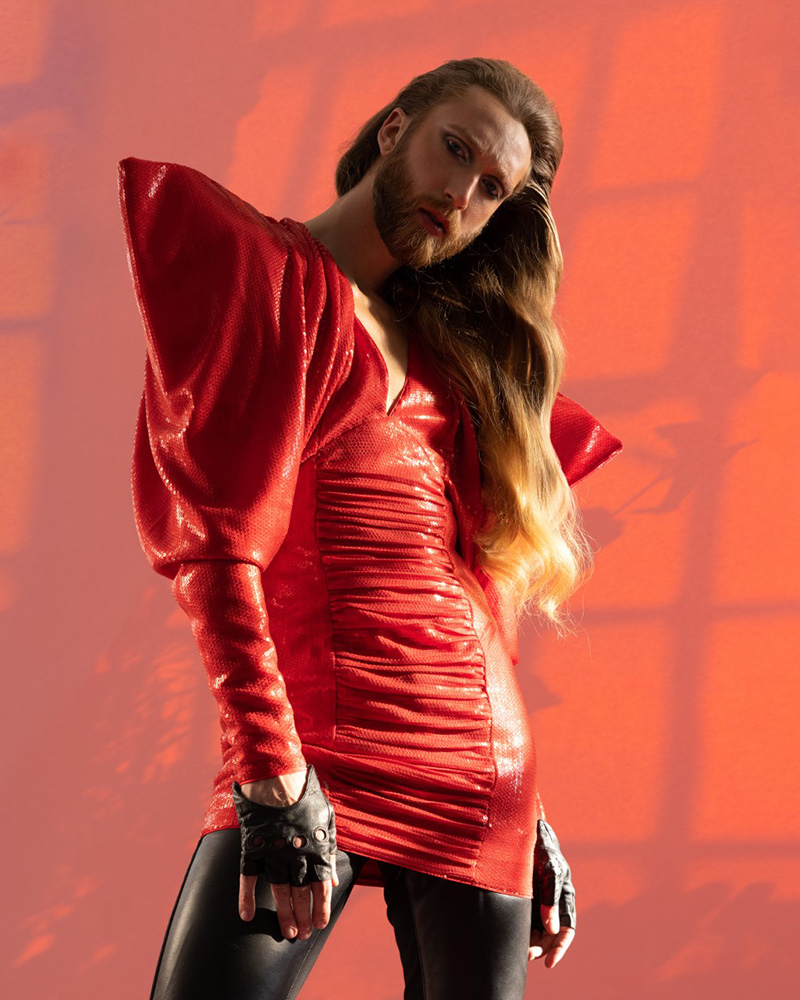As Pride Month officially commences, and a return to in-person celebrations and events becomes a much welcomed reality, it is also time to honour the plight of the queer community throughout the years. Memorializing those who sacrificed their safety in the name of acceptance is paramount, while also recognizing how far those on the LBGTQIA+ spectrum have come over last 50 years and the hurdles that still exist in the path towards equality.
We recently spoke with 1 Queen 5 Queers star and social media luminary Myles Sexton about how they use their elevated platform to raise up the queer community, how their various activist affiliations—especially with CANFAR—give them greater purpose, and how they will be celebrating Pride this month.

Growing up—similar to many queer people’s life journeys—you were ostracized for your perceived differences to the norm. How and when did you learn to reconcile those feelings of being an outcast?
“I was in my middle years of high school in a town of under 2000 people in Nova Scotia, trying to understand who I was as a person. I ended up surviving a suicide attempt and beginning that healing process made me realize that I couldn’t let those people who were bullying me every day win—I couldn’t let society win. It was just such an uplifting moment out of the darkness and it made me realize I needed to be a fighter. There were definitely other people like me that existed in my community and I used that to motivate me to represent queer people who may have been feeling similarly dejected. It was in that moment of darkness that I really found my truth and started leaning into my authenticity.”
Was there any individual, whether family or friend, who really helped you embrace your idiosyncrasies as a queer individual?
“Oh my gosh, I feel like I’ve had so many people in my life! I definitely have to recognize my privilege there, starting with my grandmother, who was such a big support for me. It was an unspoken thing, but she always just saw something special in me. Whenever we were together, I felt I could always be my authentic self around and she just let me do and be whoever I wanted. As I grew up, I met this amazing hairdresser that allowed me to see myself in a way that was beautiful, something I had never really thought previously. She was from my small town as well and her name is Sherry—she was the first person to cut and dye my hair in a way that was more edgy. We put this beautiful aquamarine colour in my hair and it was such an uplifting and transformative moment for me. I feel like in every stage of my life I’ve been able to meet and connect with different people that have just really helped push me forward.”

What does allyship mean to you in the current age?
“I think, especially in our present time, that allyship isn’t just about saying, ‘Oh my God, I’m an ally.’ I think it’s about putting in the work! Especially for someone who’s living with HIV, it’s so frustrating for me when I always have to be the educator—I don’t think that it’s necessarily always my responsibility. We as individuals should educate ourselves and seek out that information. I’m constantly looking for new pools of knowledge and I even look at the queer community for areas that I don’t fully understand, you know? Recently, I’m super into reading about polyamory because it’s just so far opposite of what I understand in my own monogamous relationship. But I think if you really want to be a true ally, it’s about putting in the work and really educating yourself because then you have the power to enlighten others. It takes a bit of that stress off of people who are living in that situation every single day.”
Pride, like most other cultural celebrations, has become extensively commodified. What key tenets must people not forget as we enter this month-long period of remembrance?
“I think Pride Month is a really great opportunity to challenge yourself to really educate—I say this also for queer people because it’s not just about the party. It can be very enlightening to take even a few hours out of the entire month and to sit down and learn something new about our history. There’s so many people that have come before us, who really fought hard for us to have the privilege we enjoy today, especially living in Canada. We would be doing them a disservice by not learning about their stories and bringing that into the celebration.
It’s also a really big opportunity for us to highlight areas of our own community that are under recognized. Queer, nonbinary, and trans people have some of the highest suicide rates within our own community. How are we also using this month as a way to shine more light onto that specific area?
However, I do find it interesting that people say, ‘Oh, Pride is so commodified.’ A lot of people are upset about that, but I think we also need to take a step back and look at the bigger picture. It’s still a form of representation when we have these companies that are putting out awareness. For what it’s worth, I believe that there is some good in creating this global pressure to adopt a positive Pride stance that can hopefully spark more change. It can maybe create a better place for ethnic people or put pressure on countries that are still super far behind in terms of their human rights for queer people. I get that these corporations should be doing more in terms of funding and giving back, but I think the rainbow flag still holds a lot of weight when we’re looking at it from an international perspective.”
How did your work with CANFAR come about?
“I had publicly come out about my HIV status in a video on Instagram, and within an hour I received a DM from CANFAR. In a matter of a few weeks I ended up having lunch with them and they asked me to be one of the national ambassadors for the organization. So yeah, CANFAR slid into my DM.”
Is there any specific goal that you have with CANFAR that you want to use your voice to shine a light on?
“I feel like it’s kind of already in the works. It’s been really fulfilling to work on Sexfluent, which is this amazing youth platform that we’ve created together. I was able to work on the backend of it before launching, helping with writing and reviewing the product and giving feedback on what types of content we needed to create. I am also one of the Sexfluent squad members and I’ve been able to create a lot of social content that hits on all of the topics that are near and dear to me.
Obviously HIV as a whole is a really big thing, but I think sexual education in the youth is really how we target change for the future. We need to eliminate how sex education is taught in such a way that places precedence on abstinence, shame, and religious values. I think we need to look at sexual health differently, especially since it is just part of human nature.”

Photography by Nick Merzetti
As a person with an elevated public profile, how do you want to use this to foster a more productive and rewarding conversation with your fans as well as during Pride time?
“Well, because I’m on platforms like TikTok and Instagram, I give audiences the fashion and the beauty, but that’s all just like a clickbait. It’s a way to reel them in with all of that and then show a video where I’m going to break down the difference between being pansexual and bisexual. Almost every week, I try to share some educational piece of content with my social media to either create awareness for HIV, sexual health, or gender identities/sexualities. I really try to focus on that and my sobriety journey as well. I don’t want it to just all be the surface, the fun stuff. I think if people are going to follow me, they also are on a ride for some education too.
I find it so interesting to watch my followers change, especially now that the 40+ generation is now getting on Instagram, they’re all starting to follow me and it’s so amazing. You have to target that demographic specifically because they’re one of the most undereducated on specific topics. It’s so inspiring when I’m getting hundreds of comments of people being like, ‘I didn’t know about this.’ I love that a video of mine could be that first little bit of expanding their knowledge.”
Lastly, how will you be celebrating Pride this year?
“Oh my gosh, this year is going to be interesting! I’ve been getting involved a lot more this year, which has been really cool. I’m going to be speaking engagements, which is really exciting. I’m also going into these corporate organizations and giving them a little bit of teach-and-learn to gain more insight about HIV or gender identity versus sexuality. I moved a bit north of the city, so I’m living like an hour and a half away from Toronto now. I’m really excited to work with a smaller town during Pride, to be involved with what we do in person and hopefully have some social media takeovers. Also, alongside the CANFAR team, we will be marching in Toronto Parade, which will be really cool. I’ve never actually been in the parade before, so that’ll be exciting.”

